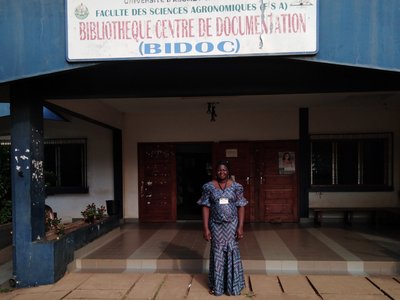

This summer school brought together students and researchers from 22 African countries involved in natural resources management and adaptation to climate change. The aim was to enhance their skills in handling the data and using it to inform management and policy. It was held from 28th of July to 11th of August 2019.
The participation in this summer school was very fruitful as Bernadette met students and researchers from other countries to share their work experiences and especially to exchange contacts for future work cooperation. Our scholar has also completed two teaching modules, the first on sustainable natural resources management and the second on geospatial research, where she learned to work with software such as Google Earth, QGIS, R- studio. In summary, these two weeks spent in Benin were very enriching for her in terms of knowledge and collaboration with other researchers and students from other African and European countries.
Bernadette Yougbare made a presentation on her PhD study entitled elucidating genomic candidate regions for trypanotolerance and body size in cattle of Burkina Faso. She also presented the results of her first paper entitled Morphometric characterization of purebred Baoulé and their crosses with local Zebu cattle in Burkina Faso. Indeed in Burkina Faso the Baoulé cattle (Bos taurus), locally called Lobi, is the most important taurine population, located in the south west part of the country. Known to be trypanotolerant but nowadays threatened by uncontrolled crossbreeding with zebu cattle. The results have clearly shown the increase in body size of the crossbreds, in line with the expectations. In addition to the breed identity comparisons, differences for crossbred groups kept by breeders with sedentary and transhumant lifestyle were also found. The animals from transhumant herds tend to be the largest in overall, with higher degree of Zebu crosses, as indicated by differences in hump presence. For breeders in Burkina Faso body size traits are of particular importance, as they prefer the larger animals that can be used for plowing and due to greater economic value. The qualitative traits were diverse in all groups, indicating the lack of strong selection on color traits for various body parts. While crossbreeding of Baoulé and Zebu cattle is prevalent, the Baoulé cattle should be conserved also in purebred form. Despite its small size and lower growth rate compared to crossbreds it is well adapted to the local environment, including trypanotolerance, which is a valuable component of the breed’s genetic heritage.
Bernadette Yougbare is a PhD candidate at the University of Natural Resources and Life Sciences, Vienna (BOKU) in the framework of the project LoCaBreed. Her research is on the elucidation of genomic candidate regions for trypanotolerance and body size in the Burkina Faso cattle. Formerly a researcher at the Institute of Environment and Agricultural Research (INERA), Burkina Faso, Bernadette holds a doctorate degree in veterinary medicine and a master's degree in epidemiology from the Inter- State School of Science and Veterinary Medicine (EISMV) in Dakar, Senegal. She has also worked with international NGOs such as Veterinary Without Borders (VSF) and the High Commission for Refugees (HCR) to support refugees in their main breeding activities.
